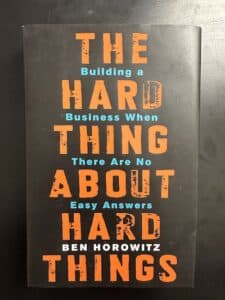The Hard Thing About Hard Things: Building a Business When There Are No Easy Answers by Ben Horowitz
Reading Time: 2 minutes
Summary
Actionable life and leadership lessons from Ben Horowitz, the founder of Andreessen Horowitz. You’ll learn about hiring for strengths rather than weaknesses, how to set expectations, the importance of trust, and how to choose the right metrics to track.
Buy this book on Amazon (Highly recommend)
Key Takeaways
What am I not doing?
As a leader, always ask yourself, “What am I not doing?” This question will often reveal some of the blind spots in your approach and strategy.
Don’t ignore the negative
It’s easy to look only at what’s going well and act on those positive results while ignoring or explaining away the things that aren’t going well. Avoid this trap. It will leave you with fewer insights and a strategy with potential holes.
Drop the excuses
Nobody wants to hear your excuses about why something didn’t get done or didn’t go as planned. Instead of focusing on detailing what happened, focus on what you can do to improve the situation and do better next time.
Hire for strengths
When interviewing, it’s easy to go with the well-rounded candidate who is good in many areas and doesn’t have any identifiable weaknesses. But this can be a big mistake. Instead of hiring for a lack of weaknesses, hire for strengths. So if someone has amazing technical capabilities and average communication skills, hire that person over the candidate who is good, but not great at either skill.
Training and performance management
Training requires clear expectations. Write a document that clearly articulates what a successful vs. unsuccessful person looks like in the role. Without proper expectation setting, performance management is sloppy and inconsistent.
Group communication
To have strong group communication, you need to define the process and structure of communications. For example, the expectations and purpose of every meeting should be very clear.
Trust
Trust is essential to facilitating healthy and successful professional interactions. If people trust you, they will listen to you, even if you are not as articulate as you could be.
Feedback
Feedback is incredibly delicate. The classic advice of giving a “shit sandwich” may work for a new employee, but not for someone more sophisticated. With all of your feedback, be authentic and express a genuine desire to give feedback for the purpose of helping the other person succeed. Be direct. Finally, understand that there is no one size fits all approach for feedback.
🙈 That's all for now! If you enjoyed this piece...
📚 If you want to discover more great books...
Explore the best books for expanding your mind, the best self-help books, the best philosophy books for beginners, books for people who don't enjoy reading, and more great books.
You might also enjoy these book notes...
- How to Get Rich by Felix Dennis
- Rich Dad Poor Dad by Robert Kiyosaki
- Made to Stick: Why Some Ideas Survive and Others Die by Chip and Dan Health
- How to Win Friends and Influence People by Dale Carnegie Book Summary
- How to Stop Worrying and Start Living by Dale Carnegie
- Fooled by Randomness: The Hidden Role of Chance in Life and in the Markets by Nassim Taleb
- Thinking in Bets: Making Smarter Decisions When You Don’t Have All the Facts by Annie Duke
- Think Again: The Power of Knowing What You Don’t Know by Adam Grant
- Start with Why: How Great Leaders Inspire Everyone to Take Action by Simon Sinek
- Radical Candor: Be a Kick-Ass Boss Without Losing Your Humanity By Kim Scott


